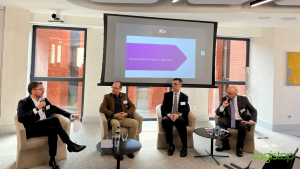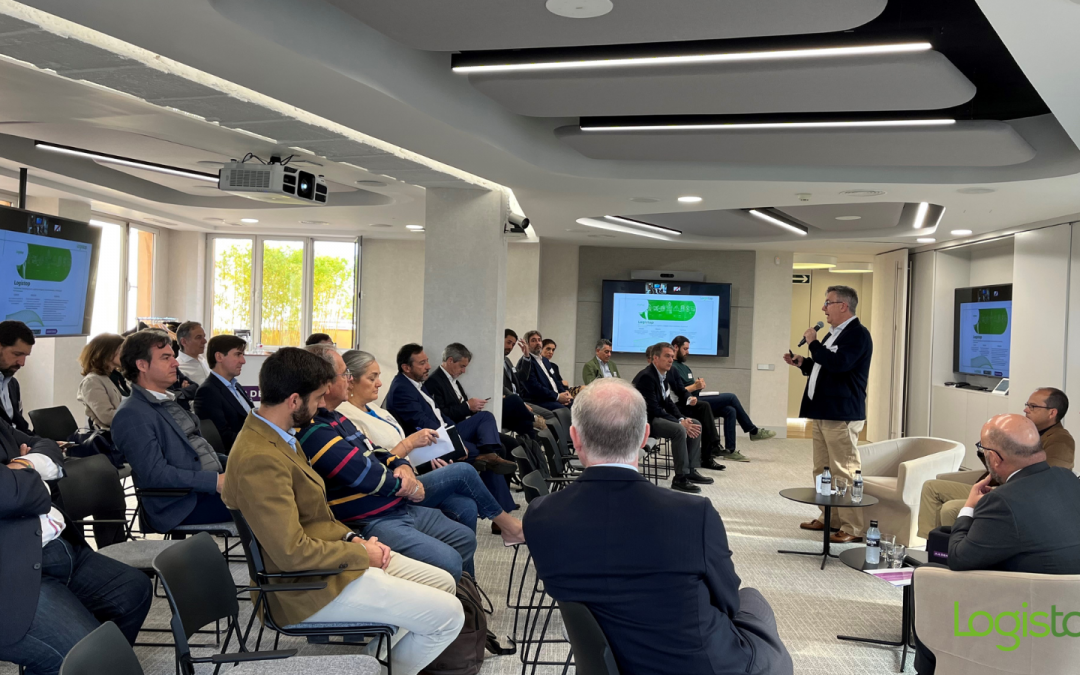Logistop, in collaboration with APPUNLE and Dentons, has organised the hybrid conference “Logistics buildings facing the energy transition: challenges and opportunities”.
The actors involved in the life cycle of warehouses and offices in the logistics sector – developers, owners and users – are taking steps to contribute to decarbonising and making logistics activities sustainable. Faced with a changing regulatory and technological environment, they are considering the best strategy to follow during an energy transition process that has already started and will last several decades. Today, energy transition is not an option, it is a challenge ahead of us.
After the welcome by Tomás de la Vega, Managing Director of Logistop, and Antonio Roncero, member of APPUNLE, Juan Carlos de Pablo, Head of Innovation for decarbonisation and sustainability applied to the logistics chain at Logistop, recommended, when managing the energy transition, “to participate in use case projects, proof of concept, scaling. …; not to remain in mere observation and theories; to collaborate, in a multidisciplinary way, between companies, associations, sectors, public-private; to understand the technological pillars and their dynamics; and to develop and update sustainable energy plans”.
Javier Orellana, expert in Energy Management and Smart Buildings and lecturer in Master’s Degrees in Engineering related to Energy and Sustainability, has analysed how digitalisation has contributed, is contributing and will contribute to the efficient management of logistics centres, concluding that the logistics warehouse of the next 10 years, principally, will have to: integrate data from all the systems that make up the building (air conditioning, energy, renewables, lighting, maintenance, PCI, security, vehicle loading, space reservation, access control, asset management, etc.); analyse these data to achieve the best possible results. ); analyse this data to achieve the four priorities mentioned (health and safety; environmental quality and comfort; energy efficiency; and productivity); communicate with other city scales (smart city); be efficient (improve operation by optimising performance and achieving predictive maintenance); be secure (cybersecurity and data protection); learn using artificial intelligence algorithms; and adapt to changes in use quickly and securely.
For his part, Luis Gil, Senior Counsel Senior Counsel Energy at Dentons, analysed the context (at European and national level), the current regulations, as well as the advantages of self-consumption as a strategy to implement in order to carry out the energy transition.
Among the advantages that it makes possible, Luis emphasised the savings in energy costs and income from the sale of energy to the grid, the aid and incentives available through subsidies, IBI rebates, etc., and, above all, he highlighted the fact that self-consumption represents a real increase in the value of the property for future users.

To end the day, Daniel Vázquez, partner and director of the Public and Environmental Law Department, Dentons Abogados, stressed that energy efficiency is not a threat, but rather a business opportunity, pointing out that “today’s investment is tomorrow’s savings and with good technical and legal advice you can obtain greater profitability”, in addition to assuming the commitments that are being transferred (and are going to be transferred) from Europe and Spain.
About Logistop
At Logistop we transform the supply chain through innovation, helping industry and companies to become more efficient and sustainable.
We are a multidisciplinary and inter-territorial working space in the logistics innovation arena formed by all the actors involved in the supply chain, as well as universities, technology centres, associations and specialised consultancy firms.
One of Logistop’s main objectives is: 1) To promote the need for innovation among companies involved in the logistics sector; 2) To promote innovation projects; 3) To communicate the real needs of the sector at an institutional level.

